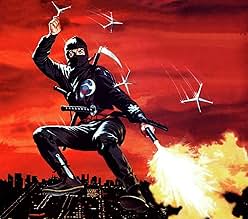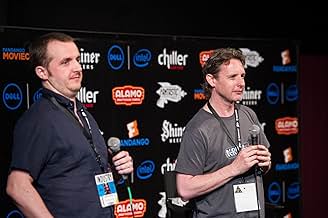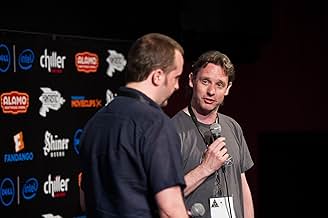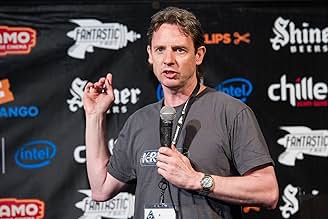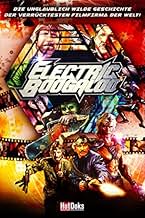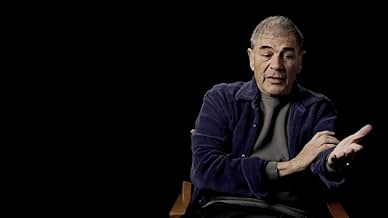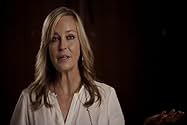CALIFICACIÓN DE IMDb
7.4/10
6.3 k
TU CALIFICACIÓN
La historia de la empresa cinematográfica independiente The Cannon Film Group, Inc.La historia de la empresa cinematográfica independiente The Cannon Film Group, Inc.La historia de la empresa cinematográfica independiente The Cannon Film Group, Inc.
- Dirección
- Guionista
- Elenco
Menahem Golan
- Self - Cannon Chairman
- (material de archivo)
Itzik Kol
- Self - Production Executive
- (material de archivo)
Roni Ya'ackov
- Self - Production Executive
- (as Rony Yakov)
Yftach Katzur
- Self - Actor
- (as Yiftach Katzur)
- Dirección
- Guionista
- Todo el elenco y el equipo
- Producción, taquilla y más en IMDbPro
Opiniones destacadas
...Answer: The Cannon Group! Started in Israel by Manahem Golan and his cousin, Yoram Globus, in the 1970s, with Golan being the more flamboyant creative force and Globus being more of the practical money man, they churned out schlock movies for about 14 years, about ten of those being in the United States for a global market. They were all about rushed scripts including Manahem making up scripts as he filmed, getting one or maybe two big names that maybe had seen better days to draw in audiences, lots of violence, bad special effects, and lots of sex and nudity. I always wondered where those trashy movies that Showtime would show late at night thirty years ago came from, and this documentary answered that question for me. The documentary moves at a rapid pace, with some of the stars that were in the films that have a good sense of humor about the whole thing such as Catherine Mary Stewart (The Apple) and Diane Franklin (The Last American Virgin) telling their stories.
Actually the documentary is a bit of a morality tale about the excesses of the 80's which pretty much overlays the time that the Cannon Group was based in the United States. Cannon Group was doing okay, even if they were making bad movies, until Michael Milken came along (remember, the guy who went to jail for what looks quaint compared to what the banksters did to tank the entire American economy 20 years later?) and managed to raise 300 million dollars for them. Accustomed to making films for just a few million dollars, sometimes less than a million, Cannon Group suddenly went on a spend and expand fest that ultimately brought them to bankruptcy. In the end they were filming and owned theater chains all over the world, and the colossal size of their failures brought them down almost exactly as the 90s began, after the cousins fought and split up and made competing films about the same dance - The Lambada - that opened the same day at the same theater in Los Angeles in 1990. Both films flopped.
Just the shear number of stories is astounding - how the cousins heading Cannon Group wound up making the Alan Quartermain movies with an actress they didn't even want because they confused Sharon Stone with "Romancing the Stone" - they actually wanted Kathleen Turner, how MGM, desperate for some product actually distributed Cannon's films for two years and, in the end, would rather sell out to Ted Turner than keep putting out such tripe, Bo Derek on the hilarious dialogue of "Bolero", and a pretty good director, Franco Zeffirelli, saying that he didn't know how to top himself after he made "Otello" for Cannon and how Manahem Golan was the only producer he'd ever met who truly understood the entire process of filmmaking and had absolutely nothing but praise for Cannon Group!
There have been many small film companies come and go, many from the Depression era in which everybody involved is dead, and their stories are probably are not nearly as interesting as this one. Watch this for the weirdness of it all and - if you are old enough - the nostalgia. One thing you can say about Cannon and the cousins that headed it - they had a willingness to take a risk that is entirely missing from filmmakers and especially their backers today. In fact, if character Max Bialystock from Mel Brooks' "The Producers" had been involved in film rather than the theater, and had been on the level and not an embezzler, he would have BEEN the colorful Manahem Golan, in my humble opinion. Highly recommended if you are interested in more recent film history.
Actually the documentary is a bit of a morality tale about the excesses of the 80's which pretty much overlays the time that the Cannon Group was based in the United States. Cannon Group was doing okay, even if they were making bad movies, until Michael Milken came along (remember, the guy who went to jail for what looks quaint compared to what the banksters did to tank the entire American economy 20 years later?) and managed to raise 300 million dollars for them. Accustomed to making films for just a few million dollars, sometimes less than a million, Cannon Group suddenly went on a spend and expand fest that ultimately brought them to bankruptcy. In the end they were filming and owned theater chains all over the world, and the colossal size of their failures brought them down almost exactly as the 90s began, after the cousins fought and split up and made competing films about the same dance - The Lambada - that opened the same day at the same theater in Los Angeles in 1990. Both films flopped.
Just the shear number of stories is astounding - how the cousins heading Cannon Group wound up making the Alan Quartermain movies with an actress they didn't even want because they confused Sharon Stone with "Romancing the Stone" - they actually wanted Kathleen Turner, how MGM, desperate for some product actually distributed Cannon's films for two years and, in the end, would rather sell out to Ted Turner than keep putting out such tripe, Bo Derek on the hilarious dialogue of "Bolero", and a pretty good director, Franco Zeffirelli, saying that he didn't know how to top himself after he made "Otello" for Cannon and how Manahem Golan was the only producer he'd ever met who truly understood the entire process of filmmaking and had absolutely nothing but praise for Cannon Group!
There have been many small film companies come and go, many from the Depression era in which everybody involved is dead, and their stories are probably are not nearly as interesting as this one. Watch this for the weirdness of it all and - if you are old enough - the nostalgia. One thing you can say about Cannon and the cousins that headed it - they had a willingness to take a risk that is entirely missing from filmmakers and especially their backers today. In fact, if character Max Bialystock from Mel Brooks' "The Producers" had been involved in film rather than the theater, and had been on the level and not an embezzler, he would have BEEN the colorful Manahem Golan, in my humble opinion. Highly recommended if you are interested in more recent film history.
Informative and enjoyable documentary about the rise and fall of Cannon Films, a beloved part of my youth. Cannon made many cheesy and low-brow movies and this doc covers most of them and, yes, insults them...a lot. I admit as a Cannon fan it bristled a bit at first but I know that their films were, more often than not, trash. But they were also, more often than not, entertaining trash. The tone of the documentary is lighthearted, with many people sharing their funny anecdotes about the crazy antics of Menahem Golan and Yoram Globus (particularly Golan). There are some nasty jabs here and there, with the Most Sour award going to former MGM exec Frank Yablans, who pulled no punches in what he thought of Cannon's output (Mr. Yablans passed away shortly after this was released). Most of the talking heads are behind-the-scenes types but there are many actors and directors also interviewed, including Molly Ringwald, Catherine Mary Stewart, Alex Winter, Franco Nero, Dolph Lundgren, Richard Chamberlain, Franco Zeffirelli, and Sybil Danning. Not a lot of time is spent on many of my favorite Cannon movies but that's to be expected given the amount of films they had to cover in the time they had. They did an admirable job of covering the major Cannon films and they told the story of Golan-Globus well. The ample use of film clips is appreciated, as is the brisk pace. I think it's something every Cannon fan should see, although be warned if you're sensitive or protective about their films you may be put off by some of it, such as "Bill S. Preston, Esquire" acting as though he has a leg to stand on commenting on Charles Bronson's acting ability. Minor annoyances aside, it's a fun look back at Cannon with some interesting trivia for those who may not be familiar with what went on during the making of some of their favorite '80s B movies.
In Tim Burton's Ed Wood, a cheapshot movie producer snorts at Ed's desire to create art on a shoestring. The irony is, of course, that however artistically credible he imagined himself, Ed Wood made junk anyway. There's a sweet spot where good intentions, lack of talent, and thriftiness meet, and Cannon Films regularly found it. The Asylum's mockbusters might be keeping the bad movie dream alive, but can you imagine a modern mini-studio greenlighting the likes of Superman, alongside Death Wish, alongside Shakespeare?
Cannon was set up in the 1960s but rose to prominence/notoriety in 1980 when it was sold to Israeli cousins Yoram Globus (the money man) Menahem Golan (the would-be moviemaker). This is where Mark Hartley's breakneck documentary joins the sordid story. Talking heads – directors, editors, and actors – provide snappy anecdotes and bitesized insights into the passion and incompetence of two upstarts who, for a time, upset the Hollywood establishment. And then spent $25m on an arm-wrestling movie.
Though remembered for Chuck Norris nonsense and some seriously ropey fantasy and sci-fi (Tobe Hooper's Lifeforce will make you question the value of cinema), at their peak Cannon were bashing out nearly 50 films a year. This left room for 'proper' movies from the likes of Franco Zeffirelli and Godfrey Reggio; Cannon even bagged an Oscar for Best Foreign Film at their mid-eighties peak. But for every Company of Wolves or Barfly there were five Charles Bronson Z-movies, so Cannon will always be remembered for the balderdash, churned out chiefly to take advantage of the burgeoning home video market.
Indeed, this is the perfect Eighties trash story, beginning with The Happy Hooker, the strangely apt story of a European prostitute coming to the US and sticking two fingers up to the Hollywood elite. The party ended with Cyborg in 1989, a Van Damme oddity which has little to do with cyborgs and whose creative failure rests partly on the shoulders of Albert Pyun, who would later find cinema's comic book nadir with his mouth-dryingly terrible Captain America. Cyborg was built with bits of Masters of the Universe, which gives us a clue as to the state of Cannon's finances at the turn of the decade. A brief 90s relaunch provided nothing of interest.
Perhaps there's a three-hour version of this documentary which delves into more depth and supposition about the essential culture clash that meant Globus and Golan failed spectacularly, time and time again, to grasp the mood of the nation they adored. But then the film would lose its briskness and humour, and Hartley's superb Uzi-editing would go to waste. It's a shallow documentary about men with shallow dreams, and it's enthralling for it.
The only real art to emerge from Cannon were exceptions that proved the rule. That rule being: Make 'em quick and make 'em cheap. By the time the bloated excess of Masters of the Universe was vomited into the multiplex (I recall that particular disappointment sorely) audiences expected more. Hartley's film may ultimately overstate the influence of Cannon – although with a new Terminator movie potentially about to join Jurassic World, Avengers, and Furious 7 at the top of the year's box office, the business model that spawned five Death Wishes and three Delta Forces does seem disturbingly prescient.
Cannon was set up in the 1960s but rose to prominence/notoriety in 1980 when it was sold to Israeli cousins Yoram Globus (the money man) Menahem Golan (the would-be moviemaker). This is where Mark Hartley's breakneck documentary joins the sordid story. Talking heads – directors, editors, and actors – provide snappy anecdotes and bitesized insights into the passion and incompetence of two upstarts who, for a time, upset the Hollywood establishment. And then spent $25m on an arm-wrestling movie.
Though remembered for Chuck Norris nonsense and some seriously ropey fantasy and sci-fi (Tobe Hooper's Lifeforce will make you question the value of cinema), at their peak Cannon were bashing out nearly 50 films a year. This left room for 'proper' movies from the likes of Franco Zeffirelli and Godfrey Reggio; Cannon even bagged an Oscar for Best Foreign Film at their mid-eighties peak. But for every Company of Wolves or Barfly there were five Charles Bronson Z-movies, so Cannon will always be remembered for the balderdash, churned out chiefly to take advantage of the burgeoning home video market.
Indeed, this is the perfect Eighties trash story, beginning with The Happy Hooker, the strangely apt story of a European prostitute coming to the US and sticking two fingers up to the Hollywood elite. The party ended with Cyborg in 1989, a Van Damme oddity which has little to do with cyborgs and whose creative failure rests partly on the shoulders of Albert Pyun, who would later find cinema's comic book nadir with his mouth-dryingly terrible Captain America. Cyborg was built with bits of Masters of the Universe, which gives us a clue as to the state of Cannon's finances at the turn of the decade. A brief 90s relaunch provided nothing of interest.
Perhaps there's a three-hour version of this documentary which delves into more depth and supposition about the essential culture clash that meant Globus and Golan failed spectacularly, time and time again, to grasp the mood of the nation they adored. But then the film would lose its briskness and humour, and Hartley's superb Uzi-editing would go to waste. It's a shallow documentary about men with shallow dreams, and it's enthralling for it.
The only real art to emerge from Cannon were exceptions that proved the rule. That rule being: Make 'em quick and make 'em cheap. By the time the bloated excess of Masters of the Universe was vomited into the multiplex (I recall that particular disappointment sorely) audiences expected more. Hartley's film may ultimately overstate the influence of Cannon – although with a new Terminator movie potentially about to join Jurassic World, Avengers, and Furious 7 at the top of the year's box office, the business model that spawned five Death Wishes and three Delta Forces does seem disturbingly prescient.
When Israeli cousins Menahem Golan and Yoram Globus took over The Cannon Group in 1979, cinema had little idea what it was in for. With the company in a dyer financial situation, Golan and Globus began churning out pictures of questionable quality at an unnerving rate, making a small profit with the odd micro-hit that quickly added up. Soon enough, the exploitation pioneers were buying up cinema chains, paying movie stars ludicrous amounts of money, taking over Cannes, and releasing some of the most diabolical and insane movies of 1980's. Electric Boogaloo tells the rapid rise and even faster implosion of the notorious studio, with the people both in front of and behind the camera telling their own anecdotes of the madcap antics that seemed to engulf their every production.
Director Mark Hartley has made a career in documenting exploitation cinema with Not Quite Hollywood (2008) and Machete Maidens Unleashed! (2010), and Electric Boogaloo is undoubtedly his most fun. Packed with clips of such cinematic disasters as Enter the Ninja (1981), Hercules (1983), Breakin' 2: Electric Boogaloo (1984) and Superman IV: The Quest for Peace (1987), the film lambastes Cannon as much as it adores their persistence, levelling the field by also showing us their more interesting efforts - the likes of Lifeforce (1985) and The Texas Chainsaw Massacre 2 (1986), both directed by Tobe Hooper - and the films that were surprisingly great, such as Runaway Train (1985) and Barfly (1987). But this isn't just a collection of clips from some of the most outlandish films ever made, Hartley ensures that the film is highly informative about the 'creative' minds behind the company and the reasons for its inevitable fall from grace.
Amongst the interviewees are John G. Avildsen, Franco Nero, Dolph Lundgren, Robert Forster, Bo Derek and Alex Winter, all telling stories that will have you laughing as well as questioning just how the Israeli's got away with it for so long. Some of it is brutal, with Golan especially coming across as an ego-maniacal tyrant with little care for the safety of his crew and no understanding of the American audience he was targeting. Yet it's all told with a nostalgic fondness, celebrating the fact that these were little guys who actually made it, and doing it all on their own terms. They were, after all, responsible for Chuck Norris's career and the prolonging of Charles Bronson's (although it's questionable as to whether or not that's a good thing), and were eager to give great but fading directors such as Jean-Luc Godard, John Cassavetes and Franco Zeffirelli another shot with complete artistic control. It's a strange story - Golan and Globus clearly adored cinema but didn't seem to understand it - but this is a success story like no other, and insomniacs with little to do at night but watch TV have a lot to thank them for.
Director Mark Hartley has made a career in documenting exploitation cinema with Not Quite Hollywood (2008) and Machete Maidens Unleashed! (2010), and Electric Boogaloo is undoubtedly his most fun. Packed with clips of such cinematic disasters as Enter the Ninja (1981), Hercules (1983), Breakin' 2: Electric Boogaloo (1984) and Superman IV: The Quest for Peace (1987), the film lambastes Cannon as much as it adores their persistence, levelling the field by also showing us their more interesting efforts - the likes of Lifeforce (1985) and The Texas Chainsaw Massacre 2 (1986), both directed by Tobe Hooper - and the films that were surprisingly great, such as Runaway Train (1985) and Barfly (1987). But this isn't just a collection of clips from some of the most outlandish films ever made, Hartley ensures that the film is highly informative about the 'creative' minds behind the company and the reasons for its inevitable fall from grace.
Amongst the interviewees are John G. Avildsen, Franco Nero, Dolph Lundgren, Robert Forster, Bo Derek and Alex Winter, all telling stories that will have you laughing as well as questioning just how the Israeli's got away with it for so long. Some of it is brutal, with Golan especially coming across as an ego-maniacal tyrant with little care for the safety of his crew and no understanding of the American audience he was targeting. Yet it's all told with a nostalgic fondness, celebrating the fact that these were little guys who actually made it, and doing it all on their own terms. They were, after all, responsible for Chuck Norris's career and the prolonging of Charles Bronson's (although it's questionable as to whether or not that's a good thing), and were eager to give great but fading directors such as Jean-Luc Godard, John Cassavetes and Franco Zeffirelli another shot with complete artistic control. It's a strange story - Golan and Globus clearly adored cinema but didn't seem to understand it - but this is a success story like no other, and insomniacs with little to do at night but watch TV have a lot to thank them for.
ELECTRIC BOOGALOO: THE WILD, UNTOLD STORY OF CANNON FILMS is a documentary that does exactly what it says on the tin. That is, to celebrate the wild heydays of Cannon Films, a 1980s production house who put out some of the biggest, silliest, cheesiest, and most effects-fuelled films of that decade.
It's a rise-and-fall tale, brought to live via copious clips and lots of interview footage with various stars, directors, and producers who were involved with the films themselves. Thus for a cinema fan - especially somebody who's seen a lot of the films, like myself - it's a real visual treat. The film is a celebration of the Golan and Globus approach - which is to churn out film after film, hoping one or two of them will be a success - and the eventual hubris which saw the company's downfall. It's constantly funny as well, which really helps.
It's a rise-and-fall tale, brought to live via copious clips and lots of interview footage with various stars, directors, and producers who were involved with the films themselves. Thus for a cinema fan - especially somebody who's seen a lot of the films, like myself - it's a real visual treat. The film is a celebration of the Golan and Globus approach - which is to churn out film after film, hoping one or two of them will be a success - and the eventual hubris which saw the company's downfall. It's constantly funny as well, which really helps.
¿Sabías que…?
- TriviaMichael Winner was going to be interviewed for the documentary, but he died before production started on it.
- Citas
Roni Ya'ackov: She said, "Menahem, I can't do it. I'm dying." He said, "Do it... then die!"
- ConexionesEdited from Omnibus: The Last Moguls (1986)
Selecciones populares
Inicia sesión para calificar y agrega a la lista de videos para obtener recomendaciones personalizadas
- How long is Electric Boogaloo: The Wild, Untold Story of Cannon Films?Con tecnología de Alexa
Detalles
- Fecha de lanzamiento
- Países de origen
- Sitio oficial
- Idioma
- También se conoce como
- Electric Boogaloo
- Productoras
- Ver más créditos de la compañía en IMDbPro
Taquilla
- Total a nivel mundial
- USD 864
- Tiempo de ejecución1 hora 46 minutos
- Color
- Relación de aspecto
- 1.78 : 1
Contribuir a esta página
Sugiere una edición o agrega el contenido que falta

Principales brechas de datos
By what name was Electric Boogaloo: The Wild, Untold Story of Cannon Films (2014) officially released in India in English?
Responda

